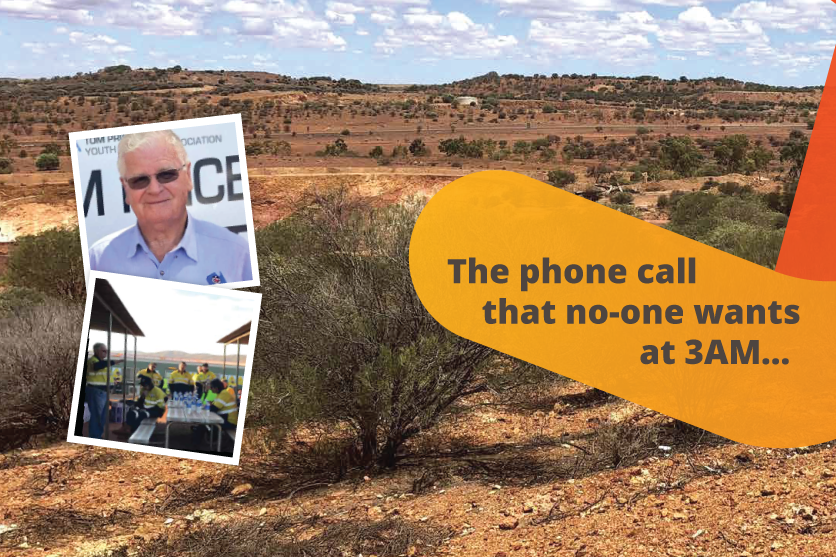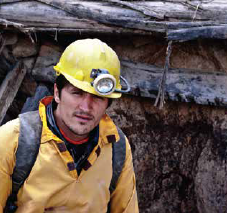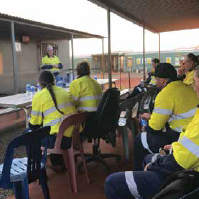
Terry’s Story: The phone call that no-one wants at 3AM…
Terry’s story shows us that people who are under pressure working away from home in Outback Australia need our help. Please, will you urgently give $25 towards support that can literally save lives like Terry’s?
When Terry* first came to the Pilbara he was excited to have a new opportunity for providing for his young family. The downside was that to do this, he would have to leave them. His job required him to head away to the Outback on-site in the Pilbara, WA, for one to three months at a time, as a fly-in-fly-out (FIFO) worker, in a mine.
The usual hardships, anxiety, dangers and isolation of living in a remote location are only part of the struggle for people like Terry who are in the Outback for work, especially on a FIFO basis. Not only are they far from home, and dealing with being separated for long periods from their wives and children. Working in a volatile industry, they constantly feel the stress of job security.
Terry’s emotional lifeline and highlight of the day was his twice-daily phone calls to his wife and the kids – every evening to say goodnight and in the mornings before school. It was during one of these cherished phone calls, that stress finally pushed Terry to breaking point. The phone went dead…
Can you imagine the panic?
The pain? The fear?
At that moment, Terry thought his life had changed.
His wife had abandoned him.
The Skype call disconnected.
Terry couldn’t get through no matter how hard he tried.
She didn’t answer.

When the line suddenly went dead Terry’s mind went to a terrible place. The anxiety and loneliness he was feeling came to a head. Suddenly, he was sure his wife had deliberately disconnected the call … and his family didn’t want him anymore. Fortunately for Terry, that was the point when people like you could step in. Your support helps our bush chaplains like Reverend John Dihm to be there. Providing the essential pastoral care to people in the Pilbara and other remote areas in Australia.
Because of the extreme pressure a FIFO career loads onto miners and their relationships, Reverend John is regularly on-site at the mine in his local town, giving talks to equip them to look after their mental health. He is also on-call for them. So when Terry fell into the depths of despair that night, he knew he could reach out to Reverend John. The urgency of the phone ringing at 3AM instantly shocked Reverend John awake. In a shaky voice, Terry revealed he’d been up all night and had taken some pills.
Reverend John tried to offer as much comfort as he could there and then, before immediately dialling the camp nurse and doctor. They went straight to Terry’s room. “I drove straight there and we made him vomit,” says Reverend John. “That night, we saved him.”
“He’d thought in this desperate moment that his wife and family didn’t want him anymore. But what had happened was lightning had hit the communication tower near the camp and wiped out all the communications. We got his wife back on that phone in the morning, before the kids went to school. As he spoke to her, the tears just flowed between the two of them. It was so beautiful.”
I’m sorry to say, but unlike Terry’s story, there isn’t always a happy ending. Reverend John knows this too well. His chaplaincy services to local miners in his town started with a tragedy.
“I got a phone call one lunch-time and a man had committed suicide,” he remembers. “They said ‘we don’t know what to do, would you come over and talk to the staff?”
Sadly, funding for mental health services are 10 times less in remote Australia yet rates of suicide in the bush are more than twice as high as they are in the city. And when a person at rock bottom decides there’s no way out but to take their own life, it inflicts such devastation and grief on those left behind. You’d do anything to stop anyone going through that heartbreak.
I am happy to say that because of Reverend John, Terry is well and has been in an emotionally stable place for some time. I am constantly amazed at the work of our bush chaplains and the fact that they are walking alongside people in remote Australia, making a real and life-saving difference to those who need it the most.
A gift from you helps by keeping Frontier Services bush chaplains like Reverend John at the frontline, on the road and on-call. Your help means that when someone’s in trouble in the Outback, even across vast distances, support is at hand.
Your help means a young man is alive today who wouldn’t have been otherwise. A young family hasn’t lost a dad and husband.

“Tell the generous people who give to us, thank you for everything and to please keep giving – because without them we’re nothing, absolutely nothing.”
– Rev John Dihm
So please consider making a donation of $25, $50 or a generous $100 in honor of Terry’s story, realising that if a person in a crisis like Terry has to wait for help it can cost a life – while immediate assistance can save one.
Thank you again for your generosity and I trust you’ll continue on the journey as a partner with us – and with the hardworking people of Outback Australia, including vulnerable FIFO workers, who often have no-one else there they can turn to.
Thank you,
Jannine Jackson – National Director
P.S. Just the cost to keep Reverend John on the road for a week is $230, so any amount you can give today will be a great help.


